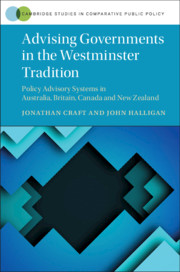 Advising Governments in the Westminster Tradition
Advising Governments in the Westminster Tradition Book contents
- Reviews
- Advising Governments in the Westminster Tradition
- Cambridge Studies in Comparative Public Policy
- Advising Governments in the Westminster Tradition
- Copyright page
- Dedication
- Contents
- Figures
- Tables
- Acknowledgements
- Glossary and Acronyms
- 1 Policy Advisory Systems
- 2 Comparative Contexts
- 3 Approaches to Understanding PAS and Change over Time
- 4 Public Services and Policy Advice
- 5 Ministerial Partisan Advisers and the Politicisation of PAS
- 6 Alternative Advice from within Government
- 7 External Advice
- 8 Understanding Westminster PAS Change
- 9 Trends, Tensions and the State of Neo-policy Advisory Systems
- Book part
- Notes
- References
- Index
1 - Policy Advisory Systems
An Introduction
Published online by Cambridge University Press: 18 December 2020
- Reviews
- Advising Governments in the Westminster Tradition
- Cambridge Studies in Comparative Public Policy
- Advising Governments in the Westminster Tradition
- Copyright page
- Dedication
- Contents
- Figures
- Tables
- Acknowledgements
- Glossary and Acronyms
- 1 Policy Advisory Systems
- 2 Comparative Contexts
- 3 Approaches to Understanding PAS and Change over Time
- 4 Public Services and Policy Advice
- 5 Ministerial Partisan Advisers and the Politicisation of PAS
- 6 Alternative Advice from within Government
- 7 External Advice
- 8 Understanding Westminster PAS Change
- 9 Trends, Tensions and the State of Neo-policy Advisory Systems
- Book part
- Notes
- References
- Index
Summary
Quality policy advice is essential for good governance, but the advice needed, who provides it and how, have evolved in Westminster policy advisory systems (PAS). The public service role has been transformed as new sources of advice have emerged and ministers have been critiqued for ignoring officials’ advice while focusing on the short term. In a contestable environment, public service advice is replaced by that of consultants, think tanks and political aides. Four themes guided the analysis of advisory systems: the place of advisory work in the Westminster administrative tradition; structural and organisational trends; comparative analysis of advisory systems’ stability and change; and managing PAS and implications for policy making. The main arguments are: PAS is more dynamic and complex than is currently depicted; politicisation and externalisation continue as important dynamics but need to be explained; parallel processes have operated to increase flexibility in using advice instruments and independent agencies; and PAS change has been gradual and endogenous. At the macro level, dimensions of an evolving advisory system are identified based on the directions of change, which indicates a more expansive understanding of PAS that takes into account the complexities of public policy and the centrality of government.
- Type
- Chapter
- Information
- Advising Governments in the Westminster TraditionPolicy Advisory Systems in Australia, Britain, Canada and New Zealand, pp. 1 - 16Publisher: Cambridge University PressPrint publication year: 2020
- 1
- Cited by
